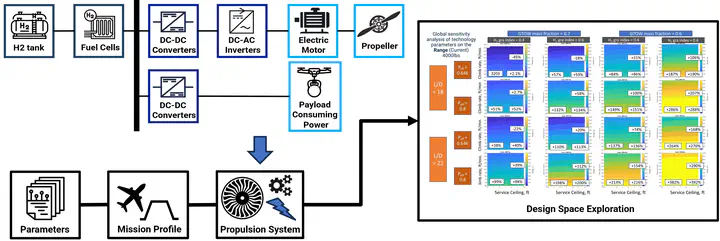Design Space Exploration and Performance Analysis of Low Temperature PEM Fuel Cell Propulsion Aircraft

This research investigates the potential of hydrogen and low-temperature proton exchange membrane fuel cells (LT-PEMFCs) as a sustainable energy source for next-generation aircraft propulsion. While prior studies have primarily focused on improving individual fuel cell components or subsystems, limited attention has been given to how variations in system-level and aircraft-level design parameters jointly influence overall performance. To address this gap, our study integrates the complete propulsion architecture from the liquid hydrogen (LH2) storage tank to the electric propulsion system within a unified modeling framework.
The developed model enables comprehensive design space exploration and sensitivity analysis, allowing users to select different LT-PEMFC configurations and systematically vary both design and operational parameters to evaluate their effects on key performance metrics such as range, endurance, and hydrogen consumption. By coupling subsystem physics with system-level performance estimation, the framework identifies critical trade-offs and dominant parameters that most strongly affect mission outcomes. This system-level approach not only supports performance prediction and technology benchmarking but also establishes a foundation for clean-sheet design optimization of future hydrogen-fueled aircraft propulsion systems.
This work is sponsored by Sikorsky, a Lockheed Martin Company, project, “Advanced Propulsion System.”